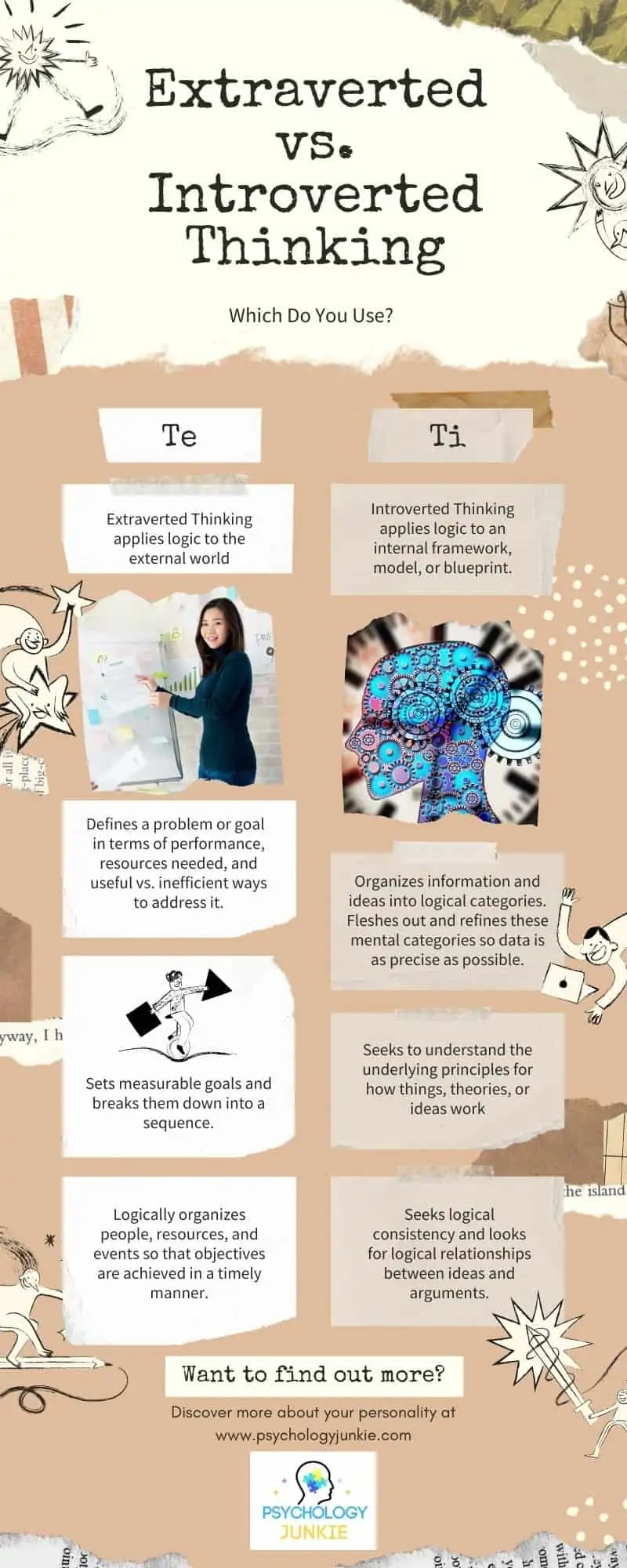Having the ability to use logic and reasoning is crucial to dwelling a fulfilled life as an individual. Each single Myers-Briggs® kind makes use of pondering, even when they bought a sense end result on the Myers-Briggs Sort Indicator®. If we didn’t use pondering we wouldn’t be capable to have any logical foundation for our choices, and we’d all be in a reasonably dangerous place.
There are two several types of pondering: Introverted Considering (Ti) and Extraverted Considering (Te). One (Ti) is internally targeted, organizing the inside world and making use of rational thought to an inside set of rules; the opposite, Te, is extra externally targeted, making use of rational thought to the skin world.

Undecided what your persona kind is? Character Hacker has probably the most correct free on-line persona indicator I’ve been capable of finding. Click on right here to take it.


Character Varieties with Dominant Extraverted Considering: ENTJs and ESTJs
Character Varieties with Auxiliary Extraverted Considering: INTJ and ISTJs
The above 4 persona sorts are going to be probably the most superior at utilizing extraverted pondering; with ESTJs and ENTJs being the obvious and expert extraverted thinkers.
Character Varieties with Tertiary Extraverted Considering: ESFP and ENFP
Character Varieties with Inferior Extraverted Considering: INFP and ISFP
Varieties with tertiary and inferior extraverted pondering will often look to introverted feeling first to attempt to make choices. If an issue can’t be solved with feeling, they may then revert to extraverted pondering. Below stress, INFPs and ISFPs can fall “into the grip” of inferior extroverted pondering. This could trigger them to turn out to be uncharacteristically harsh, crucial and detrimental in direction of others. That is not like them, and often will solely come out throughout circumstances of utmost or persistent stress.


Extraverted Considering (Te) is all about taking the chaos of the exterior world and turning it into one thing structured, logical, and environment friendly. Te customers don’t simply dream up plans—they execute them. They need issues to make sense, be organized, and, most significantly, get carried out. There’s no room for infinite pondering or second-guessing—if one thing must occur, they’re on it.
As an INTJ, once I study info, I wish to know how you can use it. I instantly am making an attempt to determine how you can make the data relevant. That’s Te. It desires to know, then use info.
In distinction, my INTP pal will wish to know all the information and perceive the entire system earlier than they even care about how you can apply the data to get one thing carried out (except there’s a very urgent deadline).
Te-dominant sorts (ENTJs and ESTJs) are pure leaders, those who stroll right into a room and instantly begin streamlining processes, delegating duties, and making choices. Their minds are wired for technique, whether or not it’s via creating schedules, charts, graphs, or bulletproof enterprise plans. They need construction and clear-cut effectivity, at all times searching for probably the most direct path to a purpose.
Fast vs. Thought-about Resolution-Making
For INTJs and ISTJs, who’ve Te as their secondary operate, decision-making takes a little bit longer. That’s as a result of they first filter info via both Instinct (for INTJs) or Sensing (for ISTJs) earlier than participating their logical Te aspect. Whereas they may not seem as forceful or speedy of their execution as ENTJs or ESTJs, as soon as they decide to a call, they transfer as quick as potential to get it carried out.
Take somebody like Warren Buffett (ISTJ). He’s identified for his methodical, data-driven funding methods. He doesn’t make impulsive strikes, however as soon as he’s gathered all the required info, he commits decisively—no waffling, no hesitation.
Or there’s Nikola Tesla (INTJ). He spent years dreaming up his innovations intimately earlier than bringing them to life, however when it was time to behave, his Te kicked in, permitting him to materialize groundbreaking improvements that formed the world.
Empirical Considering and the Scientific Thoughts
At its core, Te values empirical pondering—information, knowledge, and confirmed methodologies. Many Te customers recognize and prioritize the scientific technique, specializing in measurable outcomes over summary theories. A Te consumer received’t simply surprise if an thought works; they’ll take a look at it, refine it, and implement it in probably the most environment friendly means potential.
Napoleon Bonaparte (ENTJ) as soon as mentioned, “Ambition is rarely in a larger hurry than I. It merely retains tempo with my mind-set.” That completely captures the relentless drive of an ENTJ—as soon as they set their thoughts on a purpose, they push ahead with unwavering momentum.
Motion-Oriented and Outcomes-Pushed
Te doesn’t sit round analyzing potentialities endlessly—it acts. That’s why ENTJs and ESTJs are sometimes seen as take-charge, goal-oriented powerhouses. Their choices are primarily based on tangible logic, not intestine emotions. They concentrate on what works somewhat than what feels proper.
Even these with auxiliary Te (INTJs and ISTJs) will, after some thought, emerge with a structured plan and execute it successfully. They could not rush in as rapidly, however after they do transfer, they achieve this with willpower and focus.
Te customers are sometimes voracious learners, however they don’t hoard information for the sake of it—they use it. They flip theories into actuality, concepts into motion, and methods into well-oiled machines. They make issues occur.
The Tactical Commander (ESTJ):An ESTJ army officer is given a mission with a decent deadline. He rapidly analyzes assets, assigns roles, and executes a plan to get issues carried out on time. His focus isn’t on debating why a sure tactic may work—it’s on ensuring it does work.
The Grasp Investor (ISTJ):An ISTJ accountant fastidiously tracks market traits, builds a structured funding plan, and sticks to it with out getting distracted by hype. He might take time to research the information, however when he commits, he’s assured within the numbers.
The Visionary Inventor (INTJ):An INTJ engineer spends years conceptualizing a brand new AI-driven device. She fastidiously refines the concept via analysis and simulations, however as soon as she is aware of it’s viable, she executes an in depth plan to convey it to life, securing patents and buyers.
The No-Nonsense Guardian (ENTJ)A mom of three, Claire (ENTJ) wakes up at 5 AM, has the youngsters’ lunches prepped the night time earlier than, and makes positive the morning routine runs easily. If one of many youngsters begins procrastinating on their homework, she doesn’t entertain excuses—she units a timer, breaks the project into steps, and makes positive it will get carried out. Whereas she loves her kids deeply, she believes in educating independence and effectivity, ensuring they develop up with robust work habits
The Planful Pupil (ISTJ)Jake, an ISTJ faculty scholar, doesn’t wait till the final minute to check for exams. As quickly as he will get his syllabus, he organizes his whole semester, setting reminders for assignments and breaking down giant tasks into manageable steps. Whereas his mates cram the night time earlier than, he’s already ready, calmly reviewing his flashcards and getting a full night time’s sleep earlier than the take a look at.
Am I an Introverted Thinker? How Can I Know?
Character Varieties with Dominant Introverted Considering: ISTP and INTP
Character Varieties with Auxiliary Introverted Considering: ESTP and ENTP
These persona sorts are going to be probably the most expert introverted thinkers; with ISTPs and INTPs having probably the most proficient use of it.
Character Varieties with Tertiary Introverted Considering: ISFJs and INFJs
Character Varieties with Inferior Introverted Considering: ESFJs and ENFJs
The persona sorts with tertiary or inferior introverted pondering will depend on it after they’ve first filtered each bit of data via Extraverted Feeling (Fe). In relation to decision-making, these sorts are far more involved in concord and people-oriented choices earlier than logic and rationality. Varieties with inferior introverted pondering might fall “into the grip” of this operate beneath extended stress; turning into uncharacteristically harsh, calculating, and chilly; displaying unhealthy introverted pondering.
How Introverted Considering Works


Introverted Considering (Ti) is sort of a psychological laboratory the place logic is king, guidelines are questioned, and each idea will get dismantled and reassembled till it really is sensible. Not like Extraverted Considering (Te), which is all about exterior order and execution, Ti is extra about perfecting an inside framework—a psychological blueprint for a way the world works.
Ti customers don’t simply settle for guidelines—they interrogate them. They don’t simply memorize info—they deconstruct it. Studying isn’t about making use of information as rapidly as potential (that’s Te’s area); it’s about understanding it on the deepest stage. If Te is a builder placing up a home, Ti is the engineer fine-tuning each single element, ensuring that not a single screw is unfastened earlier than transferring ahead.
Continually Evolving Logic
Te customers wish to make fast, assured choices and transfer on. Ti customers? Not a lot. Their logic is at all times evolving, at all times open to refinement. They’re the individuals who will spend hours analyzing an idea simply to ensure they’ve bought it proper—even when they aren’t planning on doing something with that info instantly.
That’s why Ti sorts are usually skeptical of exterior guidelines, standard knowledge, and even the scientific technique itself (as a result of, let’s be trustworthy, science is at all times altering). The place a Te consumer will take a confirmed method and apply it, a Ti consumer will take that very same method, break it aside, and ask, However is that this one of the simplest ways?
Albert Einstein (INTP) famously mentioned, “Schooling is what stays after one has forgotten what one has discovered at school.” Translation: Simply because one thing is taught as a rule doesn’t imply it’s really helpful or right. Clint Eastwood (ISTP) took it a step additional: “Go away all people alone. Let all people else do what they need. Simply keep out of all people else’s hair.” Traditional Ti—impartial, skeptical of authority, and allergic to individuals telling them how you can suppose.
Deep Thinkers, Environment friendly Doers
Right here’s a enjoyable contradiction: Ti customers don’t like being rushed, however they’re obsessive about effectivity. Not compelled effectivity (like a well-organized schedule)—we’re speaking psychological effectivity. Ti customers are at all times searching for the neatest, most elegant resolution—the one which cuts out all pointless steps and makes a system work higher with the least effort. This typically makes them look lazy, however in actuality, their “shortcuts” are simply smarter methods of doing issues.
The identical applies to speech. Ti customers don’t waste phrases. They’re direct, analytical, and allergic to fluff. Nevertheless, ENTPs and ESTPs (who’ve auxiliary Ti) are usually extra talkative as a result of they entry Extraverted Instinct (Ne) or Extraverted Sensing (Se) first. Meaning they’ll throw in additional anecdotes, connections, or observations earlier than attending to the precise level—not like their ISTP and INTP counterparts, preferring to only say what must be mentioned and transfer on.
How Ti and Te Remedy Issues In a different way
Let’s say you hand a Te consumer and a Ti consumer the identical downside: a malfunctioning machine.
The Te consumer (ESTJ, ENTJ, INTJ, ISTJ) will get a fast overview of the problem, establish probably the most environment friendly resolution, and begin fixing it instantly. Velocity is essential.
The Ti consumer (ISTP, INTP, ENTP, ESTP) will mentally take the machine aside, analyze each part, and search for why it broke within the first place. They may take longer, however their resolution is often extra optimized.
Te will get issues carried out quick, however typically with errors. Ti takes its time, however when the work is completed, the system is flawless. Each approaches have their strengths and weaknesses.
Ti Examples in On a regular basis Life
1. The Unconventional Pupil (INTP)
Let’s think about Jake, an INTP philosophy main. He not often research in the best way his professors advocate as a result of he finds most examine strategies inadequate. As an alternative, he develops his personal technique—cross-referencing totally different sources, breaking theories into logical parts, and reconstructing them in his thoughts. He may not take probably the most structured strategy, however when it’s take a look at time, his grasp of the fabric is deeper than anybody else’s.
2. The Arms-On Drawback-Solver (ISTP)
A mechanic with ISTP preferences will get known as to repair a automobile. As an alternative of simply changing the defective half, he figures out why it failed and how you can forestall future breakdowns. He’s not following a step-by-step restore handbook—he’s counting on logic, instinct, and an intuition for effectivity to ensure the automobile runs smoother than earlier than.
3. The Element-Oriented Instructor (ENTP)
Ms. Larson, an ENTP highschool instructor, loves difficult her college students to suppose as an alternative of simply memorizing information. If a scholar asks her a query, she received’t simply give the reply—she’ll poke holes of their assumptions and drive them to rethink their reasoning. Her class could also be chaotic at occasions, however by the tip of the yr, her college students aren’t simply reciting information—they perceive them.
4. The Environment friendly Guardian (ESTP)
A father with ESTP preferences doesn’t observe strict parenting guidelines. As an alternative of forcing a inflexible bedtime routine, he experiments with totally different schedules to see what works finest for his youngsters. If one thing isn’t environment friendly, he alters it. He’s versatile, logical, and at all times discovering methods to optimize every day routines with minimal effort.
Considering – Strengths and Weaknesses
Te Customers – The Good:
Logical and rational
Organized
Good at scheduling
Good at delegating
Direct and forthright
Environment friendly
Productive
Glorious at following via on tasks
Sturdy management expertise
Onerous working
Te Customers – The Unhealthy (Not all Te customers could have these traits. They are usually extra widespread amongst unhealthy/unbalanced Te customers):
Will be tactless and harsh
Will be seen as too controlling
Impatient
Rigid
Bossy
Can lack emotional intelligence
Can trample different individuals’s wants in an effort to “get issues carried out”
Will be condescending to individuals who sluggish issues down or query their strategies
Ti Customers – The Good:
Analytical and rational
Centered on accuracy over outcomes
Good at constructing and setting up frameworks
Glorious at troubleshooting
Good downside solvers
Eager at discovering inconsistencies
Expert at enhancing methods
Have a knack for understanding how issues work
Ti Customers – The Unhealthy (Not all Ti customers could have these traits. They are usually extra widespread amongst unhealthy/unbalanced Te customers):
Usually cussed
Can lack tactfulness and sensitivity
Detest guidelines and tips
Will be insulting and condescending to others
Will be paranoid about others controlling them
Can begin a whole lot of tasks, and never end them
May even see individuals as issues to be solved greater than people with feelings
Could wrestle to know their very own emotions
What are your ideas?
How do you utilize introverted or extraverted pondering? Do you ever really feel that you simply’re misunderstood due to your pondering choice? Let’s speak about it within the feedback! I’d love to listen to from you!
Different Articles You May Take pleasure in:




















